The Unlimited Debt Solution, Central Banker Santa Claus
Stock-Markets / Financial Markets 2012 Dec 15, 2012 - 01:36 PM GMTBy: Doug_Wakefield
 “Yes Virginia, there is a Central Banker Santa Claus”
“Yes Virginia, there is a Central Banker Santa Claus”
Draghi Gets ECB Backing For Unlimited Bond Buying, Reuters, Sept 6, 2012
Fed Announces Unlimited QE3: The Central Bank Could Pump Money Into the Economy Until the Job Market Improves, US News & World Report, Sept 13 ‘12
Japanese Election: The Promise of ‘Unlimited Easing’, Sparks More Yen Weakness, Money Morning, Nov 21, 2012
Yesterday, I was talking with a long/short manager I have worked with since 2005. His career started out in the bond markets on Wall Street in the 1970s, so he has watched an enormous amount of change in the markets and the tools used to manage money for clients over the last four decades. He spoke about a recent article that reminds us all that there are extremely negative consequences that have been developing, especially in 2012, from the idea of “unlimited money”. As you read the opening paragraphs from the Dec 13th article, The Federal Reserve’s Zombie Economy, you will notice a totally different view from “rescuer” being presented by the central bankers and political leaders in the articles above.
Deutsche Bank is out with a new warning that says the Federal Reserve’s latest round of an estimated $1.02 trillion in total annual purchases of U.S. Treasuries and mortgage-backed securities is creating lemon socialism, a U.S. economy filled with the financially undead.
Deutsche notes that stock markets are based on winners and losers, but there are neither right now. That’s because the Fed keeps pumping liquidity into the system, so everyone wins. When everyone wins, no one makes money, a bridge to nowhere Japan has already crossed.
Is the problem with the actions of these central bankers that they really do not understand that unlimited is limited? I find that hard to believe, since they have spent their entire careers supposedly studying the financial markets. However, in case at this stage in their careers they need some help understanding what a monstrous mess they have created, let me suggest they read the research of two men who are academics today, but have worked for the International Monetary Fund. The following are quotes, pulled from the book, Endgame: The End of the Debt Supercycle and How It Changes Everything (2011) by John Mauldin and Jonathan Tepper, and are originally found in the work, This Time Is Different: Eight Centuries of Financial Folly(2011) by Carmen Reinhart and Kenneth Rogoff.
“The lesson of history, then, is that even as institutions and policy makers improve, there will always be a temptation to stretch the limits. Just as an individual can go bankrupt no matter how rich she starts out, a financial system can collapse under the pressure of greed, politics, and profits, no matter how well regulated (or might we not say unregulated when looking at the hundreds of trillions in global derivatives?) it seems to be. …
“As for financial markets, we have come full circle to the concept of financial fragility in economies with massive indebtedness. All too often, periods of heavy borrowing can take place in a bubble and last for a surprisingly long time. But highly leveraged economies, particularly those in which continual rollover of short-term debt is sustained only by confidence in relatively illiquid underlying assets, seldom survive forever, particularly if leverage continues to grow unchecked.” [Comments in italics are my own, Endgame, page 93]
If you are reading this article and have any way of contacting the “leaders” mentioned in the first three “unlimited” articles at the open on this one, I would encourage you to get a copy of these books in front of them as soon as possible. Considering the fact that the Fed alone is publicly telling us about the $85 billion dollars a month they are printing up monthly just to buy up existing debt, and the cost of these two books is less than $30 from this $85 billion pool, the cost of education seems extremely cheap.
So which is it? Are these men liars or fools or both? What is it that keeps the public in denial that as Mauldin comments from his own book, “There are no good endings once you start down a deleveraging path”? Do they or we really believe in the “unlimited Santa”?
In my humble opinion, the actions of most global political and financial leaders today is one that has been around for almost 500 years.
“Men are so simple and so ready to follow the needs of the moment that the deceiver will always find some one to deceive….So a prince need not have all the aforementioned good qualities, but it is most essential that he appear to have them. Indeed, I should go so far as to say that having them and always practicing them is harmful, while seeming to have them is useful.” [The Prince (1532), Niccolo Machiavelli]
As for the public at large, whether in Germany or China, Japan or England, US or Saudi, I do not seriously believe that most individuals will be surprised when they watch the deleveraging of the idea of “unlimited”.
“Lenin is said to have declared that the best way to destroy the capitalist
system was to debauch the currency. By a continuing process of inflation,
governments can confiscate, secretly and unobserved, an important part of
the wealth of their citizens. By this method they not only confiscate,
but they confiscate arbitrarily; and, while the process impoverishes many,
it actually enriches some. The sight of this arbitrary rearrangement of
riches strikes not only at security, but at confidence in the equity of the
existing distribution of wealth…As the inflation proceeds and the real
value of the currency fluctuates wildly from month to month, all
permanent relations between debtors and creditors, which form the
ultimate foundation of capitalism, become so utterly disordered as to be
almost meaningless; and the process of wealth-getting degenerates into a
gamble and a lottery.
Lenin was certainly right. There is no subtler no surer means of
overturning the existing basis of society than to debauch the currency. The
process engages all the hidden forces of economic law on the side of
destruction, and does it in a manner which not one man in a million is able
to diagnose.” [The Economic Consequences of Peace (1919), John Maynard Keynes, pg 235-236]
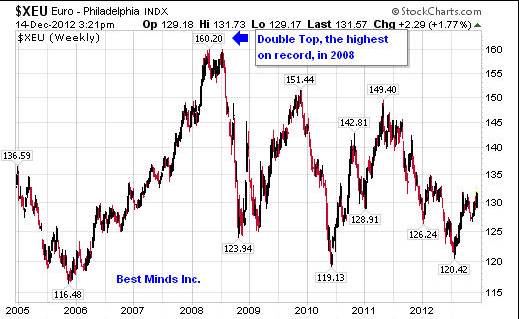
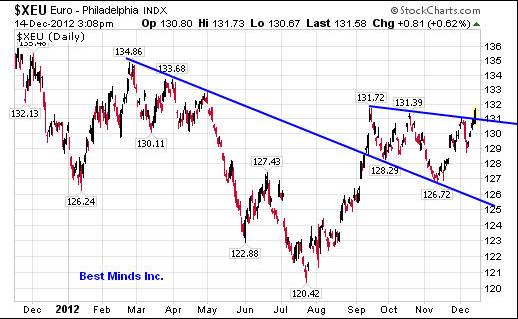
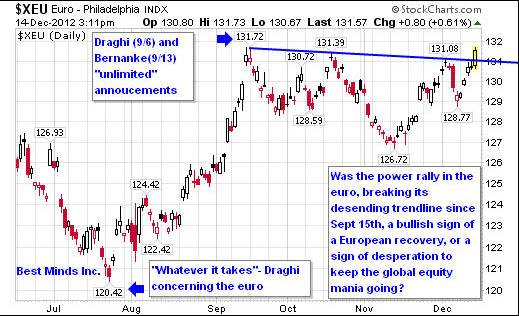
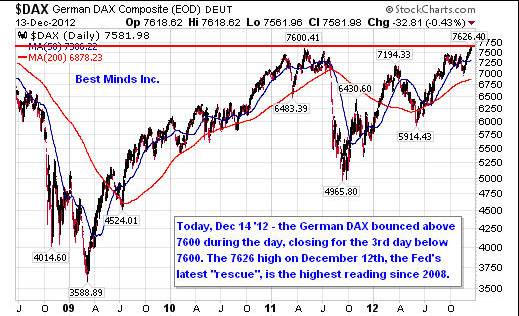
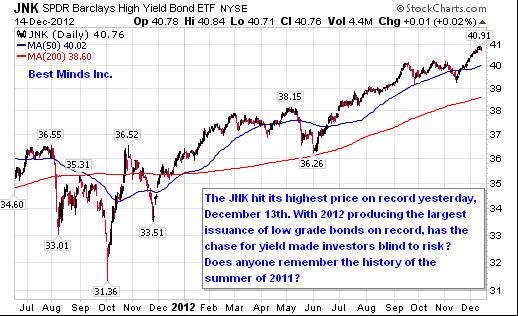
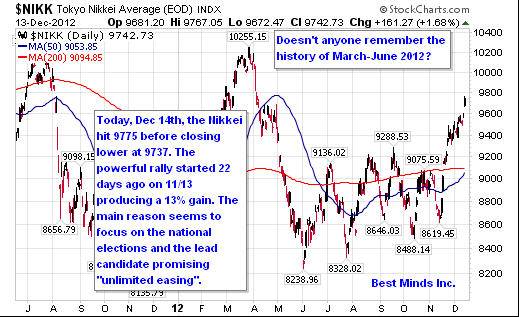
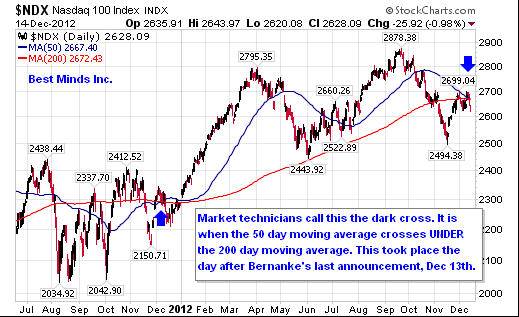
Two thousand years ago, Christ made the following statement, as found in the Gospel of Matthew, the sixth chapter.
“No one can serve two masters, for either he will hate the one and love the other, or he will be devoted to one and despise the other. You cannot serve God and wealth (mammon).”
In a culture where we are told repeatedly that we are being rescued from yesterday’s debt problems with more debt, and our central bankers will continue to provide “unlimited” debt as the solution, has the EXPERIENCE of temporary “wealth” become our god?
…“if people feel that their financial situation is better because their 401(k) looks better or for whatever reason — their house is worth more — they're more willing to go out and spend," Chairman Ben Bernanke told reporters. "That's going to provide the demand that firms need in order to be willing to hire and to invest." [Fed Seeking to Create Wealth, Not Just Cut Jobs, Yahoo Finance, Sept 14 ‘12]
To subscribe to my most comprehensive research and trading commentary, consider a subscription to The Investor's Mind: Anticipating Trends through the Lens of History. Using our own minds has never been more crucial. If you have never read my research paper on short selling, Riders on the Storm: Short Selling in Contrary Winds (Jan ’06), I would encourage you to click here to download it for free.
Doug Wakefield
President
Best Minds Inc., a Registered Investment Advisor
2548 Lillian Miller Parkway
Suite 110
Denton, Texas 76210
www.bestmindsinc.com
doug@bestmindsinc.com
Phone - (940) 591 - 3000
Alt - (800) 488 - 2084
Fax - (940) 591 –3006
Copyright © 2005-2012 Best Minds Inc.
Best Minds, Inc is a registered investment advisor that looks to the best minds in the world of finance and economics to seek a direction for our clients. To be a true advocate to our clients, we have found it necessary to go well beyond the norms in financial planning today. We are avid readers. In our study of the markets, we research general history, financial and economic history, fundamental and technical analysis, and mass and individual psychology.
Disclaimer: Nothing in this communiqué should be construed as advice to buy, sell, hold, or sell short. The safest action is to constantly increase one's knowledge of the money game. To accept the conventional wisdom about the world of money, without a thorough examination of how that "wisdom" has stood over time, is to take unnecessary risk. Best Minds, Inc. seeks advice from a wide variety of individuals, and at any time may or may not agree with those individual's advice. Challenging one's thinking is the only way to come to firm conclusions.
Doug Wakefield Archive |
© 2005-2022 http://www.MarketOracle.co.uk - The Market Oracle is a FREE Daily Financial Markets Analysis & Forecasting online publication.



